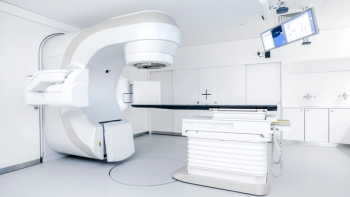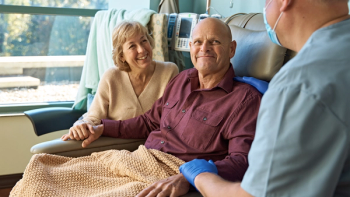
Leana Cabrera Chien, MSN, RN, GCNS-BC, GNP-BC, and William Dale, MD, PhD, discuss why geriatric assessments are important in providing individualized care.

Lindsay Fischer is an editor at ONN. She joined MJH life sciences in 2021 after graduating from Rutgers University with majors in both English and Spanish and a minor in creative writing. When she is not writing, or researching the latest oncology nursing news, Lindsay is an amateur backpacker and rollerblader. Email Lindsay at lfischer@mjhlifesciences.com

Leana Cabrera Chien, MSN, RN, GCNS-BC, GNP-BC, and William Dale, MD, PhD, discuss why geriatric assessments are important in providing individualized care.

Olaparib plus temozolomide was associated with a 27% overall response rate among 22 patients with pretreated uterine leiomyosarcoma.

Magnetic resonance-based imaging alone was 40% accurate in positively predicting pathologic complete response in patients with rectal adenocarcinoma undergoing total neoadjuvant therapy.

A triplet regimen of trifluridine, tipiracil, and bevacizumab has been approved as a treatment for patients with metastatic colorectal cancer.

The FDA has issued a complete response letter to the biologics license application for denileukin diftitox.

Patients about to undergo Mohs microscopic surgery reported that they were more likely to request over-the-counter medications if they perceived their risk of opioid addiction to be high.

The FDA has approved dostarlimab plus chemotherapy for patients with primary advanced or recurrent endometrial cancer that is mismatch repair deficient, as determined by an FDA-approved test, or microsatellite instability-high.

Patients with nonmetastatic clinically node positive bladder cancer who wish to avoid major surgery may achieve similar clinical outcomes with trimodal therapy.

The FDA has approved LeukoStrat CDx FLT3, a companion diagnostic, to help identify patients with FLT3-ITD–positive acute myeloid leukemia who are eligible to receive quizartinib.

An update to the American Society of Clinical Oncology guidelines state that all patients with cancer who are older than 65 years should receive a geriatric assessment.

Patients who listen to music while receiving chemotherapy may experience lower levels of distress.

Jacki Garcia, RN, BSN, CNRN; and Kristin Hendrickson, BA, RN, discuss phase 0 trials and how they can help expedite the research process for brain cancer therapies.

By 3 months postsurgery, most older patients with colon or rectal cancer had achieved functional recovery.

Patients with oropharyngeal squamous cell carcinoma who received primary radiotherapy or surgery demonstrated similar long-term patient-reported outcomes.

On-pathway regimens are associated with lower costs, and slightly higher emergency department visits and adverse event rates in cancer care.

Pirtobrutinib was associated with a 19.6-month median progression-free survival in patients with heavily pretreated chronic lymphocytic leukemia and small lymphocytic lymphoma.

The FDA has granted priority review to the biologics license application for zolbetuximab as a treatment for patients with locally advanced unresectable or metastatic HER2-negative gastric or gastroesophageal junction adenocarcinoma.

Among patients with lung oligometastases, no significant differences in overall or disease-free survival were observed with single- and multi-fraction stereotactic ablative body radiotherapy.

The FDA has approved a ready-to-dilute cyclophosphamide injection.

Arletta Jackson, RN, MSN, explains the concept of patient-centric infusion and how it benefits both nurses and patients.

Manufacturers are pulling the pralsetinib indication for patients with medullary thyroid cancer. It is still under investigation as a treatment option for patients with non–small cell lung cancer.

Clint Koerkenmeier, MHS, BSN, RN, shares which strategies his institution leverages to support oncology nurse employees.

Sarah Low RN, MSN, OCN, CMSRN; and Claudia Maldonado-Howell, RN, MSN, FNP, BS, CMSRN, highlight the importance of improving inpatient ambulation for transplant patients.

Routine surface wipe testing helps identify specific areas of hazardous drug contamination and guide nurse leaders towards establishing improved protocols.

Darcy Burbage, DNP, RN, AOCN, CBCN, shares which presentations from the 2023 ASCO Annual Meeting she found most important for oncology nurses.

Patients with breast and gastrointestinal cancers reported fewer hand-foot syndrome events following treatment with topical diclofenac gel.

Natasha Kormanik MSN, CRNP, FNP-BC, OCN, discusses accelerated vs regular approvals in hematologic oncology and how it applies to approved PI3K inhibitors.

FOLFOX was associated with lower rates or diarrhea and bowel dysfunction, but higher rates of fatigue, anxiety, nausea, and neuropathy, in data from the phase 2/3 PROSPECT trial.

What are the implications of new approvals for oncology nurses specializing in melanoma?

Brenda Martone MSN, ANP-BC, AOCNP, discusses the safety data from the phase 3 ARASENS trial.